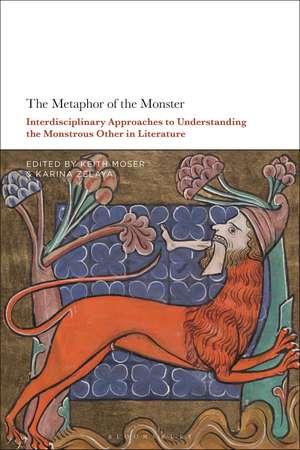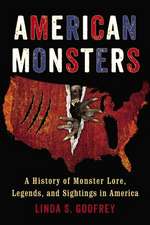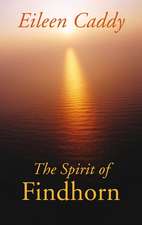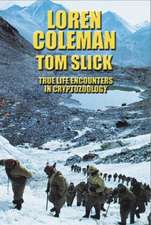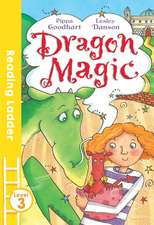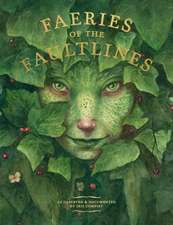The Metaphor of the Monster: Interdisciplinary Approaches to Understanding the Monstrous Other in Literature
Editat de Prof Keith Moser, Dr. Karina Zelayaen Limba Engleză Paperback – 20 apr 2022
| Toate formatele și edițiile | Preț | Express |
|---|---|---|
| Paperback (1) | 197.86 lei 6-8 săpt. | |
| Bloomsbury Publishing – 20 apr 2022 | 197.86 lei 6-8 săpt. | |
| Hardback (1) | 656.64 lei 6-8 săpt. | |
| Bloomsbury Publishing – 14 oct 2020 | 656.64 lei 6-8 săpt. |
Preț: 197.86 lei
Preț vechi: 257.92 lei
-23% Nou
Puncte Express: 297
Preț estimativ în valută:
37.86€ • 41.12$ • 31.81£
37.86€ • 41.12$ • 31.81£
Carte tipărită la comandă
Livrare economică 22 aprilie-06 mai
Preluare comenzi: 021 569.72.76
Specificații
ISBN-13: 9781501369292
ISBN-10: 1501369296
Pagini: 256
Dimensiuni: 152 x 229 x 18 mm
Greutate: 0.35 kg
Editura: Bloomsbury Publishing
Colecția Bloomsbury Academic
Locul publicării:New York, United States
ISBN-10: 1501369296
Pagini: 256
Dimensiuni: 152 x 229 x 18 mm
Greutate: 0.35 kg
Editura: Bloomsbury Publishing
Colecția Bloomsbury Academic
Locul publicării:New York, United States
Caracteristici
Brings together essays from disciplines outside of the usual purview of monster studies, including ecocriticism, performance studies, scientific discourse, history, and French- and Spanish-language studies
Notă biografică
Keith Moser is Professor of French and Francophone Studies at Mississippi State University, USA. He is the author of five full-length book projects, the latest of which is entitled The Encyclopedic Philosophy of Michel Serres: Writing the Modern World and Anticipating the Future (2016).Karina Zelaya is Assistant Professor of Spanish (Latin American Cultural Studies) at Mississippi State University, USA.
Cuprins
AcknowledgmentsIntroductionKeith Moser (Mississippi State University, USA)Part I Ecological Perspectives 1. A Portrait of Fictional Characters as Darwinian MonstersDominique Lestel (Stanford University, USA), translated by Keith Moser2. Tokyo Ghoul and the Trouble with CannibalismTony Milligan (King's College London, UK)3. Monster and Victim: Melusine from the Fourteenth Century to the Age of Homo DetritusJonathan Krell (University of Georgia, USA)4. J. M. G. Le Clézio's Defense of the Human and Other-than-human Victims of the Derridean "Monstrosity of the Unrecognizable" in the Mauritian Saga AlmaKeith Moser (Mississippi State University, USA)5. Strange Fish: Caliban's Sea-changes and the Problems of ClassificationJames Seth (Central Washington University, USA)6. Monster of Vacancy, Ghost of Culture, Instrument of Clarity: Cultural and Textual Analysis of the Function of the Sonoran Desert as Monster in Luis Alberto Urrea's The Devil's HighwayMindy Adams (Texas State University, USA)Part II Transgressive, Monstrous Gender and Corporality 7. Transgressive and Sovereign Authority in the Valois CourtTouba Ghadessi (Wheaton College, USA)8. "Maybe Something I Never Wanted Will Be Born": Etgar Keret's Monstrous Dream of MotherhoodElisa Carandina (Institut National des Langues et Civilisations Orientales, France)Part III Teaching Monstrosity in the (Post-)Modern World9. Reading Monsters: How Mary Shelley Teaches Incels to Read Paradise LostNeil Barrett (The Webb School, USA)10. "We Live in a Time of Monsters": Teaching Composition through the Representations of Monsters and Monstrosity in LiteratureDevon Pizzino (Borough of Manhattan Community College / St. Francis College, USA)Part IV Monstrosity in World Literature 11. Vamping It Up: Identity Performance and Intoxicated Bloodlust in the Poetry of Eduardo Haro IbarsAlyssa Holan (University of Wisconsin, Platteville, USA)12. The Edges of the World in Classical Greece and Epic India: A Comparison of the Monstrous Races of Ctesias's Indica and the Raksasas of Valmiki's RamayanaAlbert Watanabe (Louisiana State University, USA)13. Satire and Monstrosity in African Diasporic DramaSubbah Mir (Louisiana State University, USA)14. How a Monster Became a Hero: An Understanding of Camusian Morality through the Absurdist Hero, Don JuanScott Truesdale (University of Georgia, USA)Index
Recenzii
As they draw our gaze toward them, monsters, as Nietzsche observed, also force us to look within. This wide-ranging volume engages literary studies across numerous disciplines to explore urgent questions about encounters with monstrosity, rendered in narrative form, that challenge us to account for who we are and what we fear we might become.
Written by researchers from various disciplines, The Metaphor of the Monster opens the way to new perspectives on theories of the Other. This brilliant and original collection of essays is essential to understand better what is at stake now in our societies.
Through its multidisciplinary exploration of the myriad forms that monsters have taken across time and space, this edited collection presents an engaging and thought-provoking glimpse into the varied applications and effects of the notion of monstrosity.
Written by researchers from various disciplines, The Metaphor of the Monster opens the way to new perspectives on theories of the Other. This brilliant and original collection of essays is essential to understand better what is at stake now in our societies.
Through its multidisciplinary exploration of the myriad forms that monsters have taken across time and space, this edited collection presents an engaging and thought-provoking glimpse into the varied applications and effects of the notion of monstrosity.
